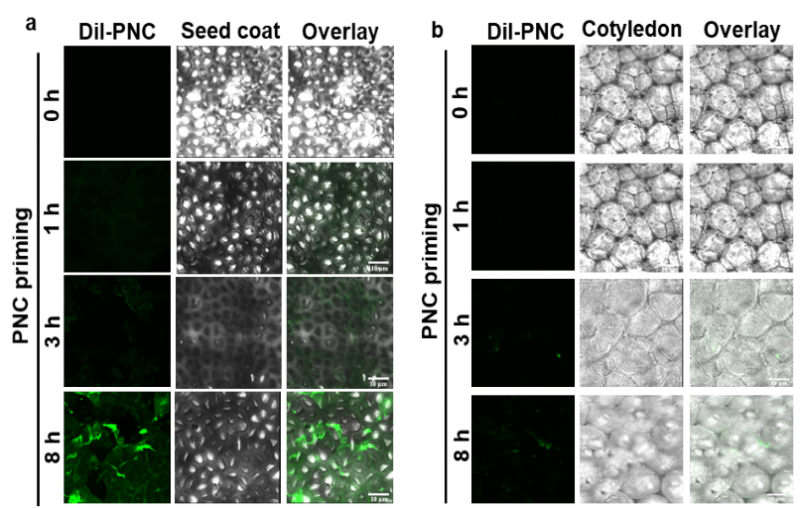您所在的位置:
近日,继报导氧化铈纳米颗粒提升棉絮抗盐工作能力的原理科学研究(Liu et al. 2021, Journal of Nanobiotechnology)后,华中农业大学绿色植物科技进步学校吴洪洪专家教授研究组在Journal of Nanobiotechnology线上发布了名为“Nanoceria seed priming enhanced salt tolerance in rapeseed through modulating ROS homeostasis and α-amylase activities”的研究分析毕业论文,报导了氧化铈纳米颗粒种籽引起提高油菜子抗盐工作能力的很有可能原理。
盐胁迫是危害粮食作物高效率制造的具体受限要素之一。油菜子做为全球普遍种植的关键农作物,盐胁迫比较严重影响到了其生产量与质量。除此之外,运用油菜子开展盐碱地改良也是现在的一个科学研究网络热点。因而,提升油菜子抗盐工作能力不但能够推动油菜子的盐碱土栽种,也可以有益于能够更好地进行盐碱地改良。纳米复合材料种籽引起(应用纳米复合材料对种籽开展引起)在增强农作物耐盐中具备很大的使用发展潜力。殊不知,有关纳米复合材料种籽引起提高农作物抗盐工作能力的实际原理仍有很多未知之处。
氧化铈纳米颗粒种籽引起提升了油菜子小苗钠钾稳定保持工作能力
在本分析中,科学研究工作人员生成了聚丙烯酸装饰的低Ce3 /Ce4 夹杂比例的氧化铈纳米颗粒(PNC)。根据PNC引起油菜种子8钟头,明显地提高了油菜种子在盐胁迫下(200 mM NaCl)的出苗率、生物量及其水份消化吸收。盐胁迫下,根据PNC引起油菜种子明显减少了出芽7天后的油菜子小苗臭氧成分(·O2-和H2O2)及其增强了抗氧化酶活力(SOD、POD、CAT)。与此同时,PNC减少了盐胁迫下油菜子小苗地面上部及其根茎的Na 成分,提高了K 成分,保持了不错的Na /K 稳定。之上結果证实,PNC根据减轻氧化应激及其保持正离子均衡提高了油菜种子在盐胁迫下的萌发工作能力。
α-胃蛋白酶是种子萌发期内承担木薯淀粉溶解的主要酶。本研究发现,盐胁迫下PNC明显增强了油菜种子引起期内的α-胃蛋白酶活力。qPCR数据显示,PNC引起上涨了与α-胃蛋白酶有关的2个遗传基因(AMY1和AMY2)表述量。这种結果证实PNC根据管控油菜种子α-胃蛋白酶活力,提高了其在盐胁迫下的萌发工作能力。除此之外,激光共聚焦结果显示,种籽引起期内,PNC大多数粘附在种皮表层,表层PNC和油菜种子种皮中间很有可能也存有相互影响,进而提高其耐盐工作能力。本分析从臭氧稳定均衡和α-胃蛋白酶视角阐明了氧化铈纳米颗粒种籽引起提高油菜子抗盐工作能力的体制,为纳米复合材料种籽引起提高农作物抗盐原理科学研究带来了大量基础理论支撑点。总而言之,本科学研究进一步展现了绿色植物纳米技术生物科技在增强农作物抗逆性工作能力领域的优良运用发展潜力,也说明学科交叉有可能为科学研究实践活动生产制造中的关键问题给予新的候选科学研究或技术规范。
种籽引起全过程中,氧化铈纳米颗粒在油菜种子中的遍布
华中农业大学绿色植物科技进步学校吴洪洪专家教授研究组博士研究生Mohammad Nauman Khan为该毕业论文第一作者,绿色植物科技进步学校李召虎专家教授、吴洪洪专家教授为文中通讯作者。本科学研究获得自然科学基金委新项目 (31901464,32071971),华中农业大学高端人才引入经费预算、校独立股票基金杰出人才培养新项目(2662020ZKPY001)和华中农业大学-中国农业科学院深圳市农牧业基因组研究所协作股票基金(SZYJY2021008)等新项目支助。
【英文摘要】
Background
Salinity is a big threat to agriculture by limiting crop production. Nanopriming (seed priming with nanomaterials) is an emerged approach to improve plant stress tolerance; however, our knowledge about the underlying mechanisms is limited.
Results
Herein, we used cerium oxide nanoparticles (nanoceria) to prime rapeseeds and investigated the possible mechanisms behind nanoceria improved rapeseed salt tolerance. We synthesized and characterized polyacrylic acid coated nanoceria (PNC, 8.5?±?0.2 nm, ?43.3?±?6.3 mV) and monitored its distribution in different tissues of the seed during the imbibition period (1, 3, 8 h priming)。 Our results showed that compared with the no nanoparticle control, PNC nanopriming improved germination rate (12%) and biomass (41%) in rapeseeds (Brassica napus) under salt stress (200 mM NaCl)。 During the priming hours, PNC were located mostly in the seed coat, nevertheless the intensity of PNC in cotyledon and radicle was increased alongside with the increase of priming hours. During the priming hours, the amount of the absorbed water (52%, 14%, 12% increase at 1, 3, 8 h priming, respectively) and the activities of α-amylase were significantly higher (175%, 309%, 295% increase at 1, 3, 8 h priming, respectively) in PNC treatment than the control. PNC primed rapeseeds showed significantly lower content of MDA, H2O2, and ?O2? in both shoot and root than the control under salt stress. Also, under salt stress, PNC nanopriming enabled significantly higher K retention (29%) and significantly lower Na accumulation (18.5%) and Na /K ratio (37%) than the control.
Conclusions
Our results suggested that besides the more absorbed water and higher α-amylase activities, PNC nanopriming improves salt tolerance in rapeseeds through alleviating oxidative damage and maintaining Na /K ratio. It adds more knowledge regarding the mechanisms underlying nanopriming improved plant salt tolerance.
全文连接:
https://jnanobiotechnology.biomedcentral.com/articles/10.1186/s12951-021-01026-9
文章版权备注
文章版权归 郑州天顺食品添加剂有限公司 所有
文章链接:https://www.tsswhg.com/14567.html
未经授权,禁止任何站点镜像、采集、或复制本站内容,违者通过法律途径维权到底!
上一篇: 专家预测俄罗斯茶叶价格上涨
【推荐阅读】
- 2022-03-0780元!霞浦海参价格继续涨,北方春参也要涨?
- 2022-02-10华中农业大学油菜团队在磷脂酶及其水解产物的功能研究中取得进展
- 2022-01-12中华人民共和国农业农村部公告第514号
- 2021-09-28重庆邮局海关截获一批植物种子
- 2021-09-232021—2022年度油菜秋冬种生产技术意见
- 2021-09-21乳化剂分类、作用及在食品工业中应用
- 2021-09-15日本加强对中国产毛豆中苯醚甲环唑、油菜花中哒螨灵的残留量监控检查
- 2021-10-14通辽奈曼旗市场监督管理局积极开展食品安全监督抽检工作
- 2023-04-03钙类食品添加剂滴定检测方法研究进展
- 2021-09-19谷物配比对多谷物共挤压粉估计血糖生成指数的影响(二)



 豫ICP备19024296号
豫ICP备19024296号 售前咨询
售前咨询